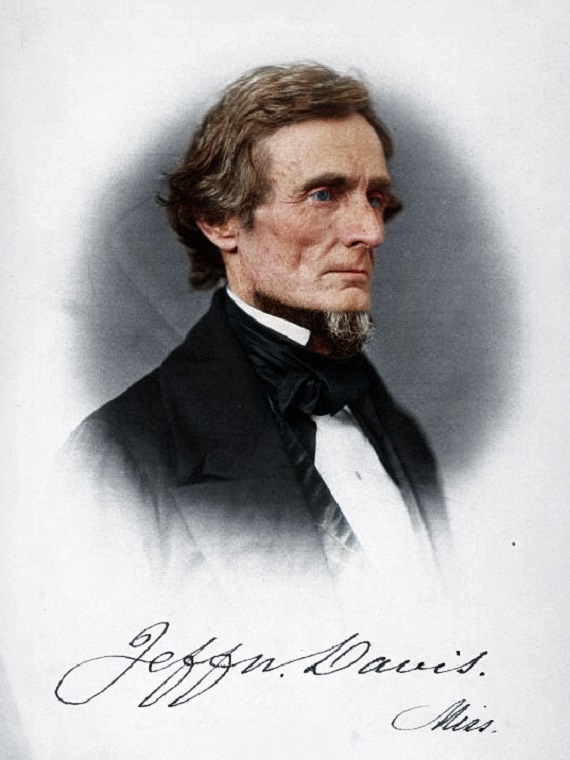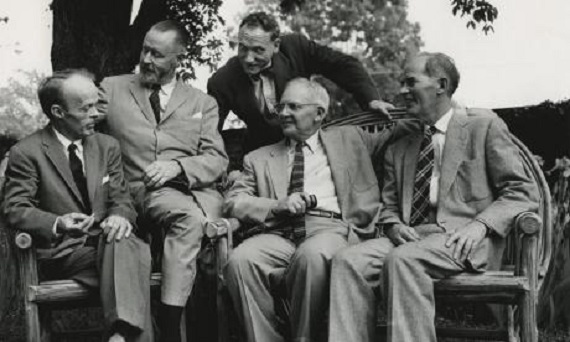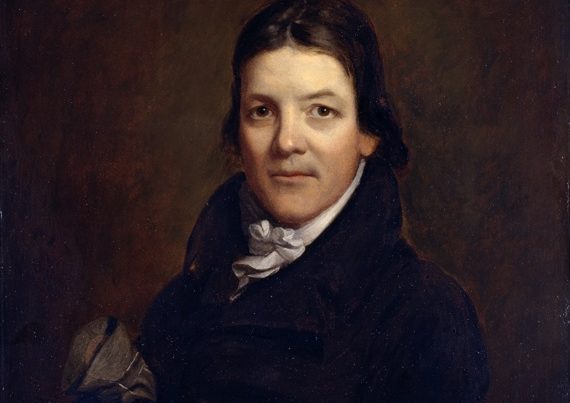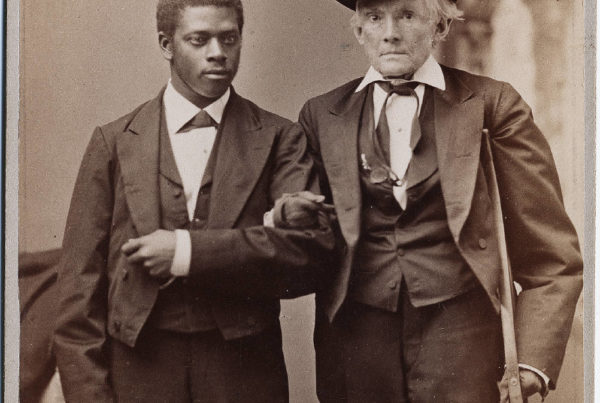In 1866 Margaret Junkin Preston of Lexington, Virginia, a sister-in-law of Stonewall Jackson, wrote a poem she called “Regulus.” Regulus was a Roman hero who was tortured by the Carthaginians but never yielded his honour or his patriotism.
Her verse, which did not mention Jefferson Davis by name, was a reflection on the imprisonment of President Davis—a tribute to Davis’s nobility and patriotism under suffering and an indictment of the viciousness of his captors. Indeed, our President’s lowest point in fortune was also his finest hour. In the horrors of defeat and conquest after a sacrifice that has few equals in history, the internal conflicts of the Confederacy slipped into the background for most Southerners. Jeff Davis, brave and unyielding under torment, become a revered symbol for his people, and would remain so ever after.
Of course, it will surprise all the brilliant scholars conducting that other tax-supported meeting here in town, that Southerners like Mrs. Preston were well-versed in the classics. Among the tortures inflicted on Regulus by Rome’s worst enemies, the Carthaginians, was removal of the eyelids. She compares this to the Yankees shining a light in Jeff Davis’s eyes 24 hours a day.
Have ye no mercy? Punic rage
Boasted small skill in torture, when
The sternest patriot of the age—
And Romans were all patriots then—
Was doomed, with his unwinking eyes,
To stand beneath the fiery skies,
Until the sun-shafts pierced his brain,
And he grew blind with poignant pain,
While Carthage jeered and taunted. Yet,
When day’s slow-moving orb had set,
And pitying nature—kind to all—
In dewy darkness bathed her hand,
And laid it on each lidless ball,
So crazed with gusts of scorching sand,
They yielded—nor forbade the grace
By flashing torches in his face.
Ye flash the torches! Never night
Brings the blank dark to that worn eye:
In pitiless, perpetual light,
Our tortured Regulus must lie!
. . . . .
Ye have refined the torment. Glare
A little longer through the bars,
At the bay’d lion in his lair . . . .
The elected civil head of an invaded and conquered country, Jeff Davis spent two years as a prisoner of state. The very concept of a prisoner of state was unthinkable in America until it was invented by the Lincoln administration.
Let’s remember the conditions of imprisonment for this statesman who had been before the war widely esteemed for many services to the Union. He was kept in a casemate at Fortress Monroe on the inclement tip of the Eastern Shore. Do you know what a casemate is? An artillery emplacement. Conditions were eased somewhat as time went on, but at the beginning the prisoner was shackled in irons and not even allowed a Bible. Think of that. Think of that. A great American leader shackled in irons. There was no table or chair in the cell. A light was kept burning, as the poem reports, and a guard pacing around the clock. Davis was in his late 50s and had a serious eye condition and other health problems. He had been separated from his family at his capture. They had been taken away by soldiers. At first he was allowed no news of their fate and no communication with them.
The South did not want to capture Lincoln. Confederates did not think that way. But let us suppose that Mr. Lincoln had become a Confederate prisoner. I have no doubt he would have been treated with the greatest courtesy and allowed every amenity, despite all the innocent blood on his hands. The very idea reveals the different qualities of the two sides. All the Confederates had ever wanted from him was an honest, peaceful negotiation of the issues raised by secession. It is entirely possible that Lincoln as a prisoner would have yielded and would now be known in history as a peacemaker.
But the Northern government, by contrast, wanted complete conquest and domination. Supposedly the war was “to preserve the Union.” But the very attempt to coerce the Southern states required that their democratic governments be destroyed and their citizens treated as conquered subjects. Those who resisted a war wrapped in righteousness must be treated as devils, not as enemies. Especially since they had resisted righteousness with extraordinary courage, skill, and sacrifice, repeatedly frustrated the conqueror’s schemes, and refused even when conquered to recognise the aggressor’s self-proclaimed moral superiority. All Northerners did not agree with this by any means, especially those who had done the real fighting. Many wanted the true restoration of the Union that they had fought for. But the punishment, even the annihilation, of traitors against the greatest government on earth was the predominant theme of Northern politics, press, and pulpit. Of course, by the greatest government, the Republicans meant a government that served their profits and self-love. Nothing infuriated them more than the sinner Regulus’s refusal to repent even after conquest.
Had Jeff Davis escaped to the Trans-Mississippi as he intended, he might have kept alive the cause and eventually conducted a government in exile, like the Poles, Dutch, and Norwegians after their conquest by the Nazis. Lincoln seemed to have said, in his characteristic flippant manner, that it would be best if Davis were allowed to escape the country. Captured, he presented a multifaceted problem for the Northern government.
It would have been a kind of solution if he had been immediately, secretly and with little ceremony; executed by the army like the alleged assassination conspirators. But this would have brought unfavourable attention from almost the entire civilised world. As time went on, and normality regained some traction, this became less and less an option for the Republican war party. It was certainly not benevolence or a sense of mercy that prevented execution of the Confederate leaders.
Of course, there could be a trial for “treason.” But it was self-evident, if not admitted, that any such trial, if open and fair, would establish that under the Constitution there was no treason committed, at least by the Confederate government. This would have revealed the lack of legal justification for the war against the Southern States. In fact, it was not until some years later that the Supreme Court declared that the war against the South had been legal by merely asserting that might makes right.
So all they could do was to take no action except to hold onto the state prisoner.
Undoubtedly much more painful to Jefferson Davis than imprisonment and torture was the black propaganda surrounding his acts. It was alleged that he was complicit in Lincoln’s assasination, responsible for the death of Northern POWs; and that he had attempted to escape in women’s clothes. You have to read the Republican newspapers of the time in order to fully realise how dishonest and unscrupulous they were. The canard that Davis tried to escape in women’s clothes doubtless was invented to offset Lincoln’s cowardly journey to his inauguration in disguise and the hoopla about Andersonville diverted attention from equal and worse (because deliberate) abuses in Yankee prison camps.
Worst of all was the claim, repeated since by equally ignorant partisans and historians, that the President of the Confederacy should be grateful that he was not hanged for treason, when what he most wanted, and what the U.S. government most desired to avoid, was a trial of the issue.
Last year, I was reflecting on the anniversary of Jeff Davis’s birth, and I began to think of comparison between our president and that other president of the same period. The comparison led to my setting up this program for our institute. The comparison of various aspects of the life and character of Lincoln and Davis tells us a lot not only about them but also about the two different peoples and countries they represent.
Lincoln, of course, could not help the obscurity of his background. He did not know for sure the identity of at least one of his grandfathers. He could have helped, however, his attitude toward his family. He walked away and never looked back. He did not attend his father’s funeral and he did nothing for his stepmother, Sarah Johnston, who was apparently kind to him. The countless Mother’s Day sermons about Lincoln’s love for his mother, like most of the stories about his goodness, are pure garbage.
Jeff Davis was fortunate in his family on both sides. Like Lincoln he was born in a log house in Kentucky. But his father was a captain in the Revolutionary War and an industrious pioneer who prospered. Two of Jeff Davis’s older brothers led companies to fight with Andrew Jackson at New Orleans. Davis throughout his life had the support of his extended family and the families of his wives.
Davis faced the tragedy of the death of his young wife three months after the wedding. With Lincoln, on the other hand, we have the Ann Rutledge fairy tale. Henry Fonda, who was a great deal better looking than the real Lincoln, weeping over the grave of Ann Rutledge is again pure fabrication —garbage. What we do know is that Lincoln cruelly jilted Mary Owens when he found a girl of higher status, and in so doing he used the same kind of deceitful blame-shifting rhetoric he used in his political speeches.
The story of Jeff Davis and his second wife Varina is a truly great love story that would make a magnificent film. Lincoln’s marriage was not happy. Herndon, his law partner, reports that Mary Todd Lincoln’s rages sometimes drove Lincoln out of their mansion at Springfield. In the White House she lived and entertained lavishly while the Davises lived frugally as befitted a beleaugured wartime capital city. There was a nice article in the Confederate Veteran a few issues back about the Confederate White House at Christmas. Mary overspent the White House accounts, which might be termed embezzlement, and she was insanely jealous Abe threatened more than once to put her in an asylum. In fact, that is where she spent her last days, suffering debility that resembled the last stages of syphilis.
Lincoln kept his son Robert out of the service and at Harvard until late in the war when he was given a cushy and safe staff job. Davis had no military age son but his numerous nephews were all in harm’s way.
Lincoln and Davis both lost a young son in tragic manner during the war. That is why that statue in Richmond is so abominable. The statue should be of our president and his son, not a hokey portrayal of the cruel invader. Some people have no class at all.
Lincoln, of course, could also not help his limited educational opportunities. Jeff Davis received a mostly technical education at West Point. Through his own efforts later he made himself into a very liberally educated man, familiar with literature ancient and modern. Lincoln’s deprivation was not uncommon at the time and has been exaggerated. Compare him with his rival Stephen Douglas. Douglas as a young man walked—walked!—from Vermont to Illinois and taught school while he read law. Lincoln, on the other hand, was sponsored by prominent men. Douglas liberally educated himself. Lincoln showed little interest in learning that was not related to making money or promoting himself politically. As far as one can tell he had never even read the Founding Fathers, while Davis knew them like his own hand.
Lincoln treated his very brief, uneventful period of active militia service as a joke. During that very same Black Hawk campaign, Jeff Davis was leading men in the wilderness in conditions of extreme hazard and deprivation. And he earned the reputation as an officer who led from the front and took care of his men. During the War to Prevent Southern Independence Davis was frequently with the army during battle. Lincoln visited only in safe periods. Davis was literally in danger throughout the war while Lincoln lived behind massive fortifications and an abundance of troops.
Lincoln was always trying to get into office and was not very successful. Jeff Davis actually resigned from Congress to fight in the Mexican War. At the battle of Buena Vista his courage and resourcefulness saved the day for the American army, and he received a wound that troubled him the rest of his life, especially during his imprisonment.
Davis’s action indicates a real and big difference between the two sides. Lincoln sought office for power and profit and prominence, and this was true of his party and largely of the North in general. A Southerner like Davis was already prominent for who he was. The office did not make the man. For him political office was valued because it was a recognition by the people that he had served them well. Unlike Lincoln, Davis had no business interests to profit by using the government for favourable legislation and did not give out jobs and contracts to buy political support. Before the war, Jeff Davis was nationally known and respected as soldier, Secretary of War, and Senator. Lincoln was almost unknown before he became a Republican nominee for the Senate in 1858, as a result of years of industrious political wheeling and dealing.
We should not forget what this tells us about the two sides in the struggle of North and South—and what was lost in the way it turned out.
When it comes to religion, which we have already heard about—Lincoln made clever use of Biblical rhetoric. His atheism was so pronounced as a young man that his associates (he did not have friends) forced him to tone it down. Lincoln became a Christian only after he was dead. Jeff Davis was a sincere believer, he prayed and carried a prayer book with him most of the time. Where Lincoln, in his second inaugural, blamed God for the war, Jeff Davis always went to the Creator in humble petition for the welfare of his country.
And the Great Emancipator. Jeff Davis was surrounded by black people all his life. All the overseeing on his plantation was done by black men. When the Yankee forces destroyed the plantation during the war, the Davises suffered real anguish over their inability to remedy the suffering of the black people, with many of whom they remained in contact after the war.
During the war, a free black man, James Jones, acted as a confidential messenger for Jeff Davis, and another black man was entrusted with the protection of his family after capture. Lincoln never had a black friend or associate. He wanted to deport them. No blacks or Jews were allowed at his funeral. Two of Lincoln’s closest associates remarked that he was the most secretive man they ever knew. Jeff Davis was warmly admired by many who knew him personally.
Of course, Jeff Davis made mistakes, most egregiously in his support for General Bragg. To a considerable extent Confederate failure rose from the political obligation to defend all the territory as best as could be done. The whole South as well as our President expected it could defend itself until the federal government gave up the effort of conquest. They could not foresee that Lincoln would keep the war going by suppression of dissent, immense expenditures on patronage, and the ability to endlessly recruit his army from foreigners. All of these things were unprecedented and indeed unthinkable in the America that existed up until 1861. Southerners were naive. They could not believe that America could ever become a dictatorship—even under the Republicans.
Lincoln is called a military genius, although he selected one bad general after another, and made one counter-productive interference after another with his armies. To the extent that many people thought he was deliberately prolonging the war to consolidate Republican dictatorship over the country.
We can never know if someone else could have done better than Jeff Davis, and there were certainly claimants to the post, especially certain obstructive gentlemen from Georgia. But when you think of what the Confederate nation accomplished, almost from scratch—four years of gallant and skilled resistance against a conqueror with four times the resources, our President looks pretty good.
Unless you are an atheist, who believes that the side that wins is by definition the best side.
Lincoln has become the saint of the American empire. The reverence he enjoys is based mostly on a fictional account of his life. One Southern humorist said that Lincoln had so many admirers when he was dead because he had none while he was living. It is true that most of the strongest people in his own cause despised him as inadequate. The world can never been certain that his own people did not eliminate him. His sainthood was to a considerable degree a product of his assassination and party propaganda after his death, in which he was shown being escorted to Heaven by flights of angels and compared to Jesus.
Jeff Davis made mistakes, but nobody ever doubted that he was totally dedicated to his cause and always did what he believed to be the best. His speeches and messages are eloquent, forthright, moving, and exactly in the style of the Founding Fathers—a republican, small ‘r’, leader speaking honestly to the citizens. He appeals to reason and the public good. Lincoln’s vaunted rhetoric is sentimentalised and phony. As H.L. Mencken said, the Gettysburg Address is a wonderful oration, but you have to remember that it opposite of the truth. Jeff Davis was the same man in private letters and conversation and in public speeches and papers. Lincoln was a master of being different things to different people.
When Jefferson Davis walked out of that courtroom in Richmond at last a free man after two years of torment, thousands of people, black and white, lined the streets with heads uncovered, in respectful silence. And so he remains in the heart of all true Southerners as the symbol of a righteous cause.







